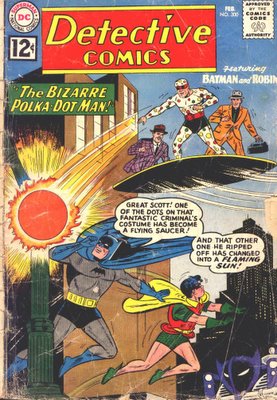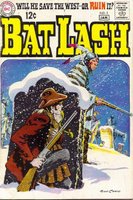There's an odd little symetry to Flash #106-108 and Green Lantern #2-4. In both cases the issues are the second through fourth of the respective title for the Silver Age. Flash Comics had been around in the Golden Age for 104 issues, so when DC decided to give the Silver Age Flash (Barry Allen) his own magazine they started with issue #105, although technically the new comic was known as "The Flash". But with Green Lantern DC decided to go with a new #1 issue, even though there had been over 30 issues of the Golden Age Green Lantern.
But aside from that, DC tried something interesting. In Flash #106-108, they presented three consecutive stories featuring one villain, Gorilla Grodd. They also presented a slightly different world--Gorilla City, which vibrated on a different plane on earth and thus was invisible to humans.
In Green Lantern 2-4, DC presented three consecutive stories featuring one villain, or should I say, a new universe of villains. The universe of Qward was organized along evil lines. There were some outlaws who insisted on being honest, but they were persecuted. One of them, Telle-Teg, contacted Hal Jordan, knowing he was a rival of Green Lanterns for the affections of Carol Ferris, to ask him to help the honest citizens of Qward to emigrate to our world. This is accomplished but not before Telle-Teg is killed. The surviving honest Qwardians warn GL that the evil Qwardians are planning on stealing "all the power batteries in this universe".
Sure enough, in the following issue, the Qwardians steal GL's power battery by a clever ruse. They recreate Ferris Aircraft Company and observe where GL has the battery hidden. They steal it from the actual location while Hal is reciting the oath to the phony battery.
But then comes a completely unbelievable plot twist. Pieface, Hal Jordan's Eskimo airplane mechanic, is fixing his landlady's TV antenna when he suddenly tunes in the thoughts of the Qwardians who are transmitting to their homeword about the successful theft of the power battery. The Qwardians succeed in sending the power battery back to Qward, but Green Lantern trails it there and retrieves it.
In the final chapter of the initial Qward saga, Pieface is wounded by radiation from a rocket that was intended to hit GL. In order to save his buddy, GL goes back to Qward to face its champion, a robot who has been designed to destroy Green Lantern. Unfortunately for the Qwardians, the programming was not tight enough, and the robot realized the difference between good and evil, and agreed to fight alongside GL against its evil masters. It gives GL the cure for Pieface and holds off the Qwardians long enough for Hal to save his buddy.
There is at least one mistake in the series. In GL #3, the capital city is given as Qwar-Deen, but in the next issue it's referred to as Qward City.








